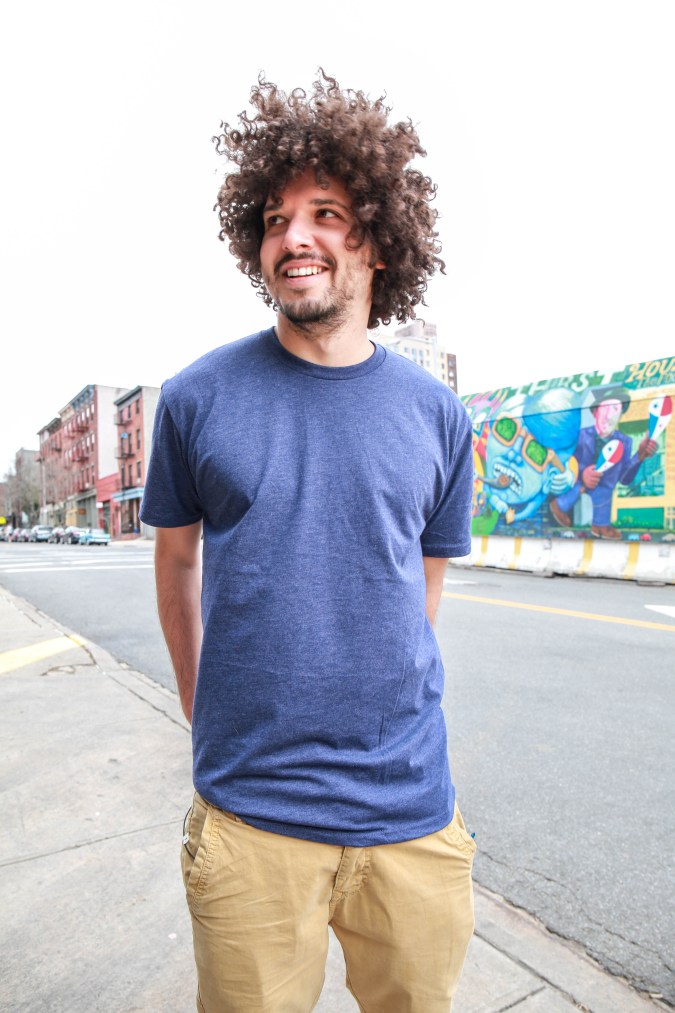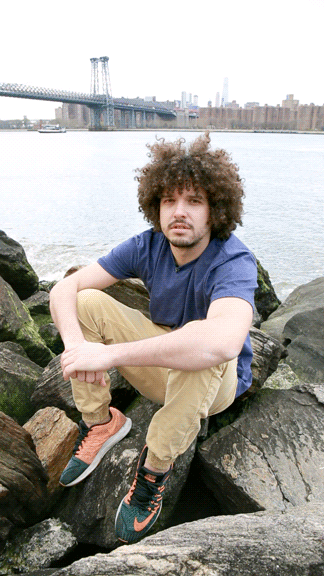Life has been moving fast for Puerto Rican rapper PJ Sin Suela. It’s been just over two years since the 28-year-old hip-hop artist — born Pedro Juan Vázquez — graduated from medical school in Puerto Rico. Up until last year, he had been rapping for proms and small crowds across the island, hopping around stages in his curly, unruly mop hair, and slowly cultivating a local fan base through his free-flowing bilingual rhymes. But in 2017, Vázquez found himself performing at sold-out venues in New York, Los Angeles, and Washington, D.C. as the opening act for Residente’s U.S. tour. “The experience was brutal,” he had said after the closing show at the Fillmore Miami Beach.
I met up with Vázquez and his crew—Rafita, his bleach-blond hype man, DJ Francisco Sabatier, and videographer Edgar Cruz—as they were filming the music video for his single “El Dedo del Camello” just a few days after Residente’s sold-out show at Terminal 5. Vázquez, handpicked by Residente for his irreverence and no-holds-barred creativity, was enjoying a comeuppance that looked dizzying from afar. But for him, the move seems to have come naturally: “His whole thing is about people being real. And I think you can know me personally just by listening to my lyrics,” PJ explains.

Born in the Bronx and raised in Ponce, Vázquez loved listening to Vico C, Outkast, Calle 13, and Eminem from an early age, but cites MTV’s Yo Momma as what first sparked his desire to rap. “I actually began rapping because of that,” he said. “We had battle raps at lunchtime, in Spanish and English, because I went to a bilingual school.” He started writing rhymes for a reggaetonero friend, then began rapping on and off up through college at Villanova and UPR, as well as while he attended medical school at Universidad Central del Caribe. One day, while playing basketball, Vázquez discovered his stage name after the sole of his sneaker came off. He had already been known for walking barefoot around the recording studio on campus, so a friend coined the term sin suela —“sole less” in Spanish — to describe him. Vázquez immediately found a new identity in it. The sole, he said, is often overlooked despite being a shoe’s most essential component. But without it, our feet are left naturally exposed to the world. He saw his music — unfettered, accessible, and genuine — in the same spirit.
“Right now in San Juan, you see the progress, but once you leave the capital it feels like there is nothing.”
Around then, he was releasing a collection of tracks that would later form the basis of Letra Pa’ tu Coco, the 2015 mixtape that reaffirmed his reputation as a grounded, candid rapper. Songs like “Mis Caras Sufriendo,” a contemplative, critical assessment of Puerto Rico and Vázquez’s personal privilege, are coupled with more digestible, laid-back party tracks like “Oda a Las Tetas” or “Live This One,” a light-hearted, romanticized rhyme that has nearly a million plays on SoundCloud and Spotify.
Most recently, Vázquez’s hard-hitting political anthems “RePResentando” and “Vivo” – the latter of which was released last year — have earned him a reputation as an incisively versatile and socially aware artist. In “Vivo,” Vázquez, who is a self-proclaimed independentista, blends rhymes in English and Spanish to drop scathing lines against Donald Trump and denounce Puerto Rico’s current colonial status: “Aunque no sea independiente y estemos en un limbo/Mi estrella es muy grande, no cabe en la de los gringos.”
Vázquez says that getting entangled in political issues was never part of his plan; it just came naturally. “I just talk about what’s happening and affects me in general,” he said. “We are in a political and economic crisis, so I talked about it.” Through his music, many see Vázquez’s biting candidness, witty lyricism, irreverent attitude, and cheeky delivery as resembling a young Residente. He doesn’t necessarily agree, but it doesn’t seem like he minds the comparison, either. “If you’re going to compare me to someone, it might as well be him,” he says, while maintaining that the two are still wildly different rappers: “our rhyme schemes are way different; what he talks about and what I talk about is different. He talks more worldly; I literally talk about my sister.”
There is also the question of beats. Whereas Calle 13 came to prominence as a reggaeton outfit after the commercial success of “Atrévete-Te-Te,” Vázquez has distinguished himself first and foremost as a rapper throughout his burgeoning career, favoring what he calls “90s boom-bappy sample hip-hop.” Given reggaeton’s outsized popularity in Puerto Rico — and the Latino music industry writ large — he’s well aware that composing a crossover track would lead to more exposure. Residente himself used the genre as a vehicle to break through to a mainstream audience, but has since largely abandoned it; Vázquez has considered doing the same. His fans, he says, occasionally ask him for more danceable music, something his family has also weighed in on: “Even my parents are like, ‘Did you listen to this new song, Despacito?’”
He addresses these concerns on his upcoming album Vital, which is being produced with the help of Pain Digital, a producer who has worked with reggaeton artists De La Ghetto and Departamento del Ritmo. One of the tracks, “San Dunga,” was unveiled today. Vázquez describes it as the “the closest song to reggaeton,” on which he responds to all of the calls for him to cross over with mild resistance. “It’s bailable, but it’s basically for people that are telling me to do that,” he said. Inspired by the popular refrain: “baile, botella y baraja,” Vázquez created a pseudo-religious figure for the title of the song. “I invented the meaning of the saint,” he said. “This is the saint that keeps your back safe while you’re partying and having a good time.”

In September, Vázquez gave his first taste of Vital with “Lo Que Nadie Quería Que Fuera,” his lead single from the album. Unlike his recent tunes, it feels much more introspective — a lingering horn adds a tinge of nostalgia over a steady synth beat — but retains Vázquez’s characteristic brashness. “It’s really personal, I talk about basically everything,” he said. “It’s five minutes of just…bars.” Vázquez penned the lyrics to LQNQQF about two years ago, shortly after finishing med school. Back then, there was much more doubt surrounding the viability of his music career. “I just wanted to be a rapper,” he reminisces as he describes the track. The song title alone gives a clear impression that the track is aimed, in part, at his early detractors, and although it seems Vázquez has finally left all of the doubt behind, there is a nagging sense that he’s not yet where he wants to be.
Once he finished his summer 2017 tour opening for Residente, Vázquez initially planned on releasing Vital in early 2018. Then, while he was back in Puerto Rico, Hurricane María hit, killing hundreds and destroying homes across the island. Vázquez and his family were safe in their home in Ponce, but the hurricane did damage the doors and shattered one of his windows. He helped relief efforts in the aftermath of the storm, distributing water and food, and even recorded “Ave María” in mourning for Puerto Rico. The song was put together in about an hour; like most of the island, he was also left without power. “I had 51 percent battery life, which was like an hour and nine minutes,” he said. “I sat in my bathroom and said ‘I’m going to write it and I’m going to record it.’ No one else touched the music after that.”
The release date for Vital has been pushed back to this summer, as much of Puerto Rico remains without power and hurricane relief efforts still lag across the island. “Right now in San Juan, you see the progress, but once you leave the capital it feels like there is nothing,” he said. It would help if Vázquez were working with a record label – he has yet to sign with one – but with a growing audience and a strong endorsement from Residente, he doesn’t appear too worried about getting one on board. He recently signed on La Buena Fortuna, the management company that represents Residente and iLe, another former Calle 13 singer. Once he’s done rapping, Vázquez said he has other plans in a more distant future: putting together a novel with his sister (he’s already written a children’s book), traveling the world, and eventually, returning to his first profession, medicine. For now, though, the music comes first.




